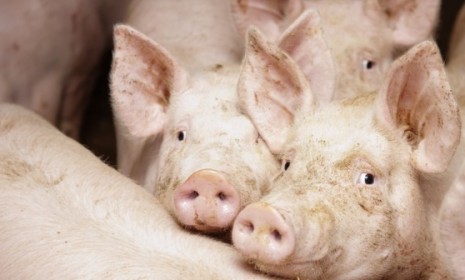Meet the 'Enviropig'
The creators of a new genetically engineered swine say it would reduce environmental pollution. Is that a good enough reason to start eating frankenbacon?

A free daily email with the biggest news stories of the day – and the best features from TheWeek.com
You are now subscribed
Your newsletter sign-up was successful
Even as the FDA is considering approving genetically modified salmon for human consumption, there's another engineered creature that's stirring debate: The Enviropig — or, to critics, "Frankenswine." The animal's Canadian creators say it is less harmful to the environment than natural pigs, and would help farmers cut costs. Really? (Watch a CNN report on the pigs)
What is the Enviropig?
It's a pig that has been genetically engineered, by researchers at the University of Guelph in Canada, to better digest and process phosphorus.
The Week
Escape your echo chamber. Get the facts behind the news, plus analysis from multiple perspectives.

Sign up for The Week's Free Newsletters
From our morning news briefing to a weekly Good News Newsletter, get the best of The Week delivered directly to your inbox.
From our morning news briefing to a weekly Good News Newsletter, get the best of The Week delivered directly to your inbox.
Why would that be beneficial?
Pig manure is high in phytate, a plant form of phosphorous. When pig farmers use the manure as fertilizer, the phosphorous enters the watershed and causes huge algae blooms that choke the oxygen supply and create aquatic "deadzones."
How did scientists create the Enviropig?
They added an E. Coli bacteria gene and mouse DNA to a standard pig embryo. With this modification, the pig's phosphorous output is decreased by as much as 70 percent. The need for costly phosphorous food supplements is also negated, so the animals would, in theory, be cheaper to raise.
A free daily email with the biggest news stories of the day – and the best features from TheWeek.com
How many of these special swine are in existence?
A family of some 20 Enviropigs currently lives on University of Guelph property.
Will we be eating Enviropig bacon anytime soon?
Hard to say. A Canadian agency has approved production of the animals under "containment procedures," and they have been submitted to the FDA for approval. A spokesperson for the University of Guelph says "We suspect the FDA is more than halfway through the process of reviewing our application," but the agency will likely require additional information and research.
Are there any genetically altered animals at the supermarket now?
No. Genetically modified grains and produce have been for sale in North America since the early-'90s, but no such animal is currently approved for consumption — although the FDA is reportedly on the cusp of approving the AquAdvantage Salmon, which grows twice as fast as natural salmon.
Are there reasons to be cautious about Enviropigs?
Organic farming advocates say farming practices, not the pigs themselves, need to be altered. Opponents of genetic modification say we are opening a Pandora's Box by creating any such organism. "It's a completely novel cell invasion technology where we are crossing the boundaries of nature as no other generation has before," says Andrew Kimbrell, the director of the Center for Food Safety. "And the question is to whether that is safe, whether that is something that we should be doing ethically. Those are very serious questions that we as a society need to be asking."
Sources: CNN, Wall Street Journal, Guelph Mercury, Digital Journal